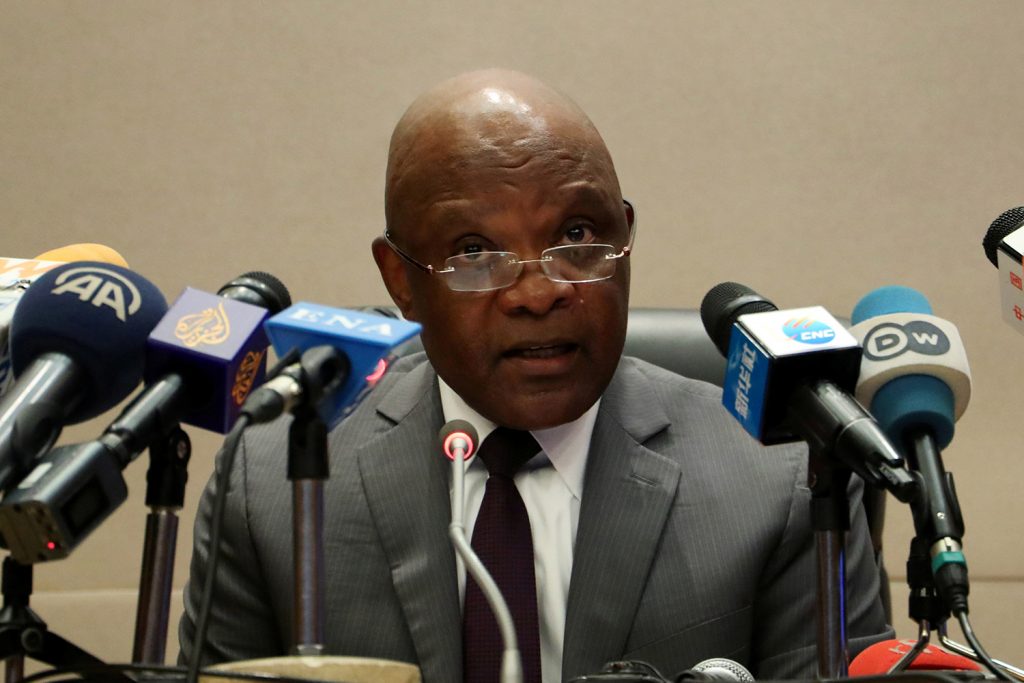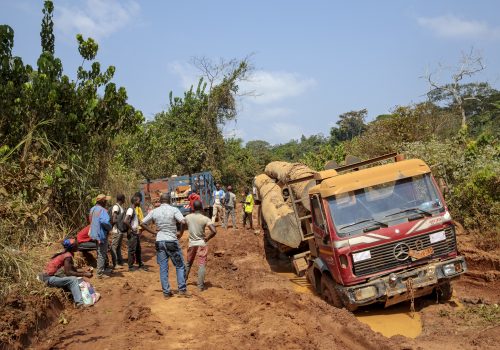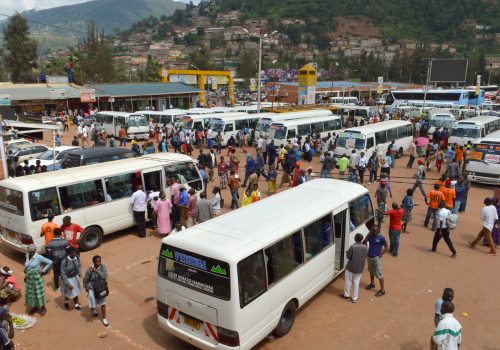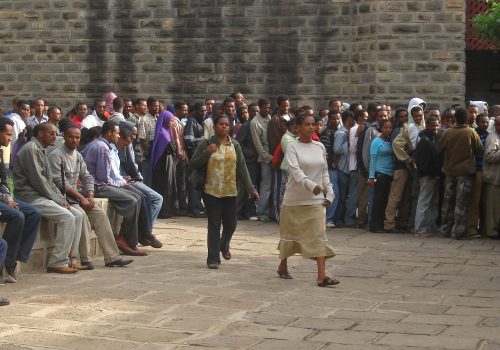On the heels of news that Africa may be spared the worst impacts of the coronavirus pandemic, African officials and advisers are calling for vigilance across the continent. While the hardest-hit countries still boast fewer than six thousand cases, “in the past four weeks or so, they have seen a 500 percent increase,” warned Dr. John Nkengasong, director of the Africa Centres for Disease Control and Prevention (Africa CDC), later adding “we are already in an outbreak and pandemic, and we have to continue to prepare actively.”
The African Union (AU), the Africa CDC’s parent organization, is gearing up partnerships across sectors—and across the world—to prepare for the pandemic. “I’m very pleased with the whole-of-society approach that the AU… has used,” Nkengasong said in an April 28 event with the Atlantic Council, joined by Jessye Lapenn, US ambassador to the African Union, moderated by Atlantic Council nonresident senior fellow Cameron Hudson, and introduced by Atlantic Council Executive Vice President Damon Wilson. “This is a global health crisis that requires global solutions and global solidarity to address it,” Nkengasong argued.
Nkengasong and Lapenn issued calls for the tools the continent of Africa needs in order to bolster their responses to pandemic-related challenges like low amounts of testing, limited medical supplies and personal protective equipment (PPE), and the spread of misinformation. “We really need effective partnerships,” said Nkengasong, eventually outlining agreements with the United States, multilateral institutions, communities, and the media that are improving the continent’s performance in the pandemic.
“We need partnerships with multilateral [organizations] as much as possible so that the continent can have a fighting chance against this,” said Nkengasong, noting that the World Health Organization (WHO) has joined the AU in crucial support to the recently-established African Task Force for Coronavirus Preparedness and Response. The WHO’s connections to the ministries of health and the AU’s connections to the heads of state can create a network of vital knowledge-sharing and collaboration opportunities. “It gives you a strong synergy at both the policy level and strategy level in respect to supporting the countries and articulating policy issues and guidance,” according to Nkengasong.
Nkengasong and Lapenn noted that although the United States may have turned some attention inward, the African continent’s previously established partnerships with the United States will help avoid the predicted three hundred thousand deaths and protect a predicted twenty-nine million people from being pushed into extreme poverty due to coronavirus. “The relationship between the US government and Africa CDC is longstanding… which gives us an excellent basis for partnership to address this current crisis,” Lapenn explained. While the United States suspended funding to the WHO, Lapenn stresses that the suspension period is intended to ensure “there is no halt or delay of our provision of assistance” and that “we are absolutely continuing to provide technical assistance and expect that will increase.”
The AU has found partnerships in the global private sector for crucial supplies like tests and PPE. In the AU Commission’s weekly coordination meetings, business leaders across Africa took the “challenge to unlock the supply chain for the continent,” to facilitate supply movement, said Nkengasong. Africa CDC also joined with a company in Germany and Jack Ma in China to source tests and distributed them among the fifty-five member countries. Still, “it’s a challenge,” Nkengasong admitted, as “the whole world is fighting the same enemy with limited commodities that exist.”
Lapenn believes “US companies will play a significant role—and want to,” stressing that their participation on the continent can stretch beyond health and supply challenges. Some US companies, Lapenn noted, want to be part of the immediate and long-term economic solution by expanding upon already-established partnerships with the AU in the context of the African Continental Free Trade Area.
Nkengasong said that even with currently low infection rates, Africa faces imminent and concerning challenges as policy aims to suppress the coronavirus’ spread in both dense and urban populations with poor sanitation on the one hand and less-governable, rural populations on the other. “Public health alone will fail in these communities,” said Nkengasong. In both areas, Nkengasong called for a community-led and community-owned response, requiring that policymakers “tailor the messages to the community.”
The community response must include engaging community leaders and educating them; it must not include “excessive force” in trying to implement policies like social distancing, which is haphazardly embraced across the continent. “We have to contextualize our social distancing,” especially as planned elections and political rallies approach, Nkengasong maintained. In insecure communities, the Peace and Security Council of the African Union is working to provide directions on must-follow guidelines under the pandemic, ensuring that the responsive policies reach every corner of the continent.
The AU is also partnering with the media to make sure that not only are people aware of crucial policies, but that they are disseminating factual information and combating misinformation pertaining to coronavirus prevention. By hosting press conferences and engaging in social media, the AU’s partnership with the media will “make sure that they assist us in providing the right info out there.” According to Nkengasong, it is important that Africa CDC continues “strengthen our coordination, communication, and cooperation during these very challenging times.”
With an uncertain future for the pandemic that lies ahead, the Africa CDC is encouraging pivotal partnerships to act quickly to secure Africa amid haphazardly understood policies, little access to water and sanitation, and resource constraints. “There’s so many unknowns at this point… but we need to continue to be extremely vigilant and do everything that is possible to put in place the strong public health systems to fight it,” Nkengasong argued.
Katherine Walla is assistant director of editorial at the Atlantic Council.
Further reading:
Image: John Nkengasong, Africa’s Director of Centers for Disease Control (CDC), speaks during a news conference on coronavirus at the African Union Headquarters in Addis Ababa, Ethiopia January 28, 2020. REUTERS/Tiksa Negeri



